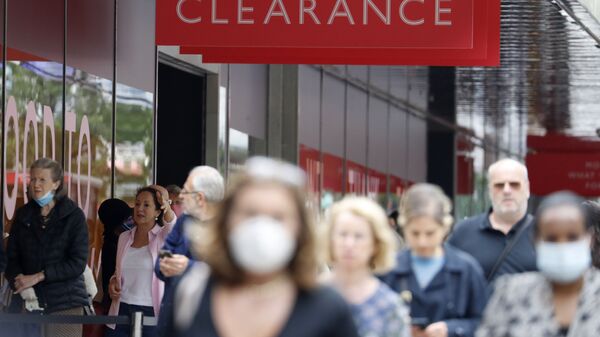Britain is heading for a double-dip recession this winter, according to new data indicating sluggish economic activity in the UK’s dominant services sector in October.
The IHS Markit/Cips monthly survey of the services sector released on Wednesday shows that the UK's post-lockdown recovery throughout the summer stalled last month, leading to increased demands of the Bank of England (BoE) to increase stimulus when officials convene later this week.
The IHS Markit report describes months of collapsing consumer confidence, which has been consistent with rising Covid-19 cases, as leading to a slashing in demand for hospitality hubs such as hotels and restaurants, and the recent introduction of the the "tiered" lockdown systems led to a halting of many across the UK returning to their workplaces.
The purchasing managers’ index (PMI) for the services sector – which encompasses accounts for three-quarters of economic activity and covers various industries including retail, hospitality, and financial services – fell from 56.1 in September to 51.4 in October, below the estimated consensus of City analysts of 52.3. Manufacturing, which is included in the composite PMI, dropped to 52.1, from 56.5 in September.
— Phoenix Professional Development ™ (@phoenixprodev) November 4, 2020
IHS’s economics director Tim Moore said that the data, which was recorded at 12 and 28 October and before the second lockdown, indicated that the economy is "on course for a double-dip recession this winter and a far more challenging path to recovery in 2021”.
Britain saw the first recession this year in the first six months because there were two successive quarters of negative growth. If a second were to take place that would make it a “double-dip”.
Employment across the services sector declined for the eighth month in a row, and customer-facing service providers, hotel workers specifically, restaurants and catering, experienced a slump. New orders also declined for the first time since June, according to the PMI report.
“A lack of forward bookings in parts of the economy most affected by lockdown measures led to widespread reports of redundancies and another sharp fall in total employment numbers during October,” Moore said.
Samuel Tombs, the chief UK economist at Pantheon Macroeconomics, described the Markit survey as suggesting that the national recovery experienced during the summer "essentially ground to a halt in October".
He said the economic impact would materialise through low GDP growth, which will be 8% below the pre-Covid peak at the end of 2020.
Tombs said that October marked a turning point and the steep decline in public and private transport use alongside a drop in demand for discretionary consumer services led to a wider economic obstruction.
“The second wave of COVID-19 is the obvious driver of the slowdown, though the recovery likely would have decelerated anyway, given that pent-up demand after the first lockdown ended temporarily pushed activity in the consumer services sector above its sustainable level over the summer", he said.
Chief economic adviser to the EY Item Club, Howard Archer, said there is "little doubt" that a second national lockdown would cause the economy to collapse again in the fourth quarter by an "appreciable amount".
The initial forecast from the EY Item Club predicts a GDP contraction of between 5 and 8 per cent in the fourth quarter.
— EY UKI (@EY_UKI) October 14, 2020
The BoE monetary policy committee is set to meet on Thursday to discuss a fresh financial injection to stimulate the economy. Though this was considered unlikely a few weeks ago, a majority of City analysts predict a £100bn increase in quantitative easing (QE) would be issued to reverse the dire market outlook.


